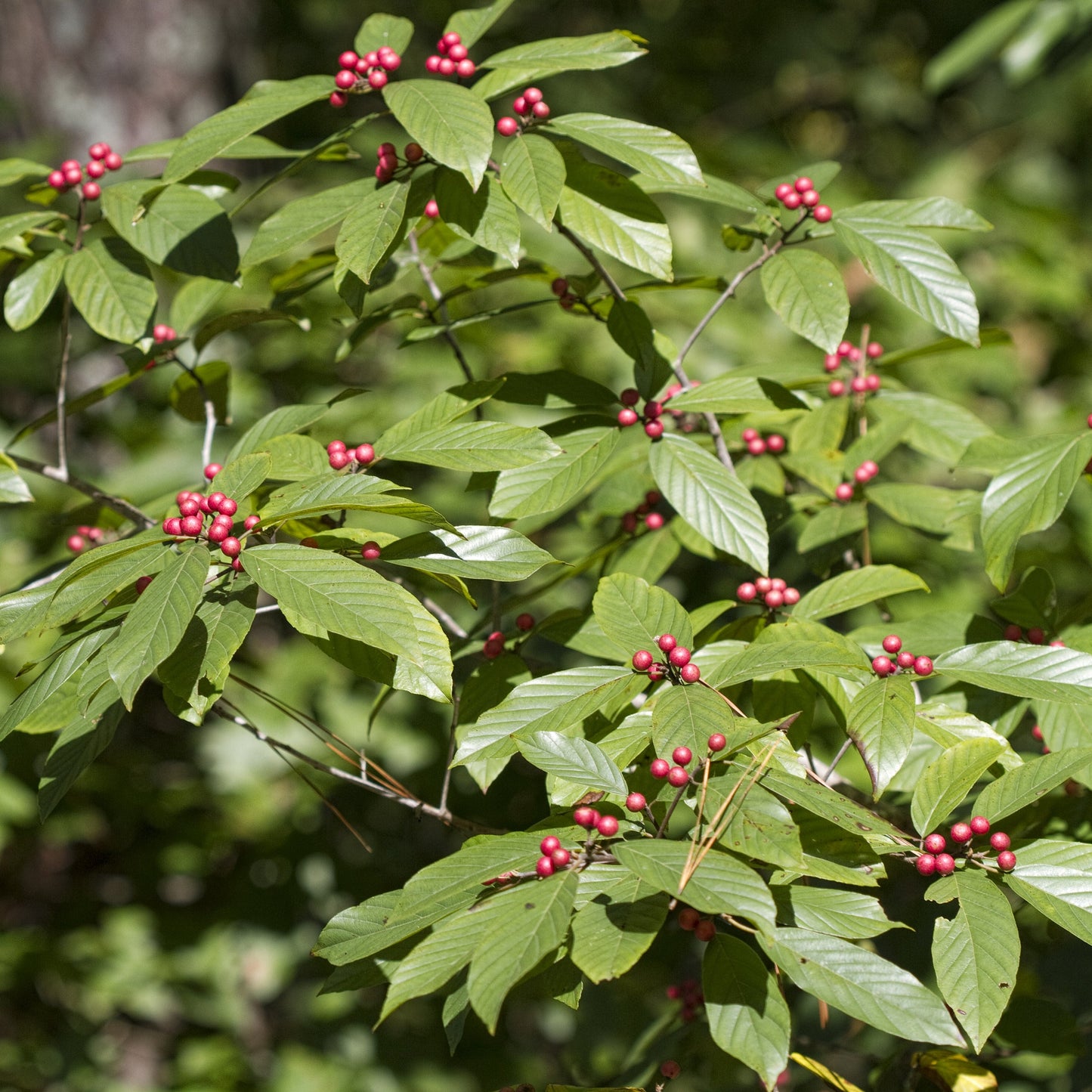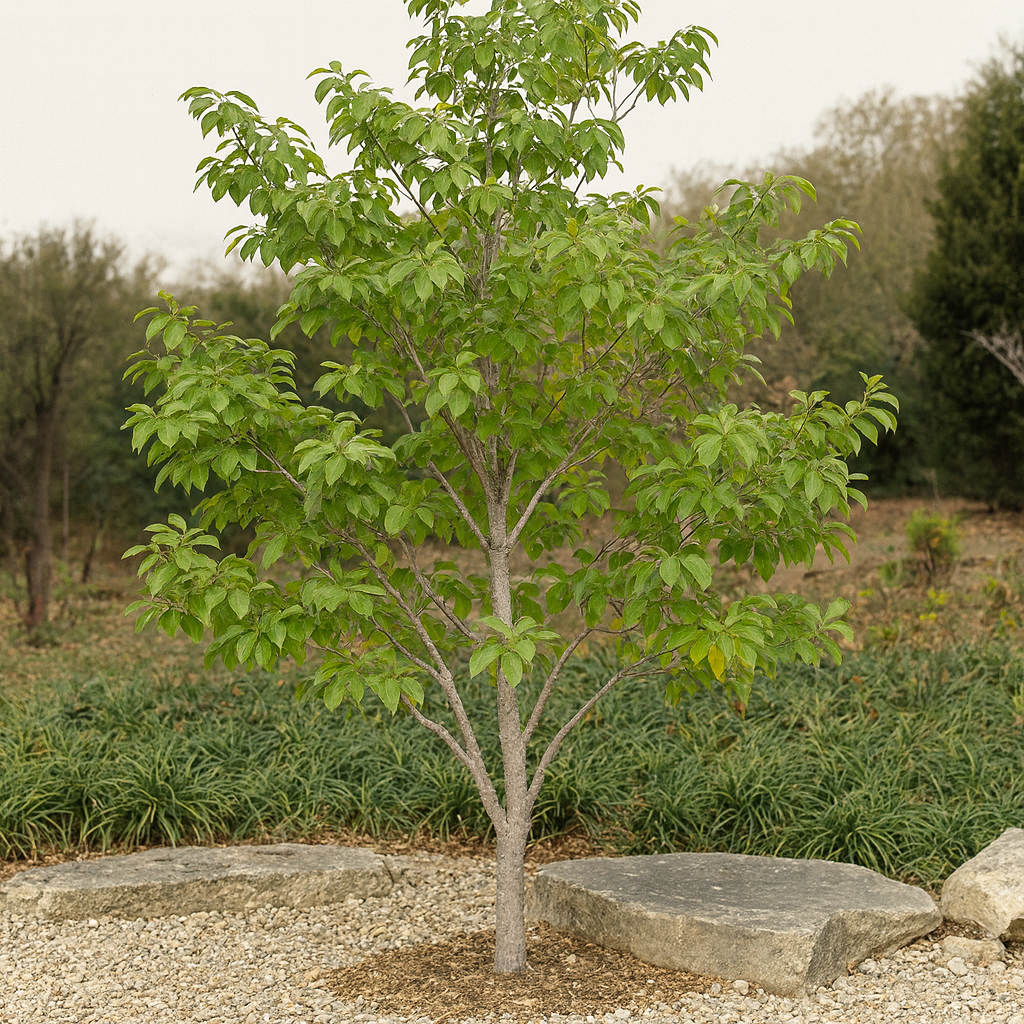Limited Quantities - Reserve Now For Fall
-
Intermediate Zones 5-9

-

Carolina Buckthorn
Carolina Buckthorn
Couldn't load pickup availability
Frangula caroliniana
Carolina Buckthorn
The Carolina Buckthorn is a graceful, small native tree or large shrub prized for its glossy foliage, wildlife-friendly berries, and surprising adaptability. Despite the name, it bears no thorns, making it a gardener-friendly choice for naturalistic landscapes, understory plantings, and pollinator gardens.
With fragrant spring blooms and vibrant red-to-black fruit, the Carolina Buckthorn brings quiet beauty and essential ecological value to a wide range of habitats.
Carolina Buckthorn Overview
| Attribute | Details |
|---|---|
| 🌿 Botanical Name | Frangula caroliniana |
| 🏷️ Common Names | Carolina Buckthorn, Indian Cherry |
| 🌳 Mature Height | 10–20 feet |
| 🌐 Mature Width | 8–15 feet |
| 📈 Growth Rate | Moderate (12–24" per year) |
| ⏳ Lifespan | 30–50+ years |
| 🧊 USDA Zones | 5–9 |
| ❄️ Chill Hours | 400–700 hours |
| ☀️ Sun Preference | Full sun to full shade (best fruiting in partial sun) |
| 🧱 Soil Type | Adaptable to clay, loam, or sandy soils |
| ⚖️ Soil pH | Acidic to neutral (5.0–7.0) |
| 💧 Water Needs | Low to moderate; drought-tolerant once established |
| 🌸 Flower Color | Small greenish-white blooms; late spring |
| 🍒 Fruit Type | Bright red to black berries; ripen late summer to fall |
| 🐝 Pollinators | Attracts bees, butterflies, and beneficial insects |
| 🌿 Growth Habit | Upright, loosely branched, small-tree form |
| ↔️ Spacing | 8–12 ft apart for naturalized settings |
| 🏡 Landscape Uses | Understory tree, woodland edges, wildlife gardens |
| 🧹 Maintenance Level | Very low |
Environmental Benefits
🌸 Provides nectar and pollen for native pollinators
🍒 Supports birds and small mammals with nutrient-rich fruit
🌱 Enhances understory diversity and native food chains
🌿 Thrives in shaded environments and helps stabilize soils
Pros & Cons
| ✅ Pros | ⚠️ Cons |
|---|---|
| 🌿 Thornless, non-invasive, and easy to grow | 🍒 Fruit not suitable for fresh eating by humans |
| 🐝 Excellent native pollinator and wildlife support | 🪰 May occasionally attract fruit-eating insects |
| 🌳 Adaptable to sun, shade, and various soils | 🌲 Sparse canopy; not ideal for dense screening |
| 🧬 Native to the Southeastern U.S. | 🌿 Slower to establish in poor or compacted soils |
| 🏡 Low-maintenance and drought-tolerant | ✂️ May need shaping if grown as a small tree |
Planting & Care Guide
🛁 Soak root zone thoroughly before and after planting
🕳️ Dig a wide hole at same depth as root crown
🌾 Mulch with 2–3 inches to retain moisture and suppress weeds
💦 Water weekly during first growing season; taper as roots mature
✂️ Prune lightly in winter or early spring to shape or remove suckers
🧪 Feed lightly with compost in early spring if desired
The Carolina Buckthorn is a hidden gem of the native plant world — elegant, thornless, and vital to wildlife. Its modest size, adaptable nature, and seasonal interest make it a top choice for ecological landscaping, shade gardens, or natural rewilding projects
Share




